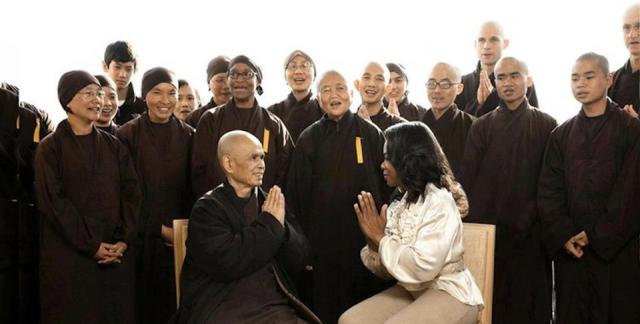It is peaceful listening to the interview with Thich Nhat Hanh as it reminds me of the importance of staying in the present moment by being aware of my breathing and knowing that being alive is a miracle itself. I agree with his observation many people, including myself, tend to sacrifice the present for the future by worrying and being distracted by events, hence coming home where the present moment is is the key to happiness as well as healing and transformation of our sufferings.
I like his deep understanding of our inter-being as we are all connected, and by understanding the nature of sufferings and being in touch with our sufferings, we can relieve our own pains and help others too – his analogy of a mother comforting her crying baby is a powerful tool of illustrating how we can take care of our own pains and anxieties through compassion. There is much wisdom and insights in his sharing, gleaned from ancient teachings and practices which I am still learning. I also find comfort in his analogy of “no life, no death” as a beautiful cloud being transformed into rain, snow or sleet, and so in the same way, our beloved ones who have passed on continue to live in and around us.
As for the second half of the video on “The Dhamma Brothers”, I noted that vipassana meditation has indeed helped the prison/rehab inmates in many ways, such as becoming more relaxed and being able to get along with one another better. One particular inmate’s testimony stood out for me – which goes something like “I used to think my greatest fear used to be growing old and dying in prison; now I think my greatest fear is growing old and not knowing myself”. I think that speaks volumes of the benefits of meditation, which includes enabling people to know themselves, perhaps as if for the first time, and embrace their fears and anxieties as part of their whole being.
I googled about vipanassa meditation and I learnt from this article that it “is a way of self-transformation through self-observation. It focuses on the deep interconnection between mind and body, which can be experienced directly by disciplined attention to the physical sensations that form the life of the body, and that continuously interconnect and condition the life of the mind.”
I think I will continue to find out more about this as it is worth practising as a lifestyle. Like what Thich Nhat Hanh said, every moment can be an opportunity to touch the miracle of being alive by going back to our breaths.
I also managed to find his book “No death, no fear” online, which was mentioned during the video interview with Oprah Winfrey. I like what he wrote here:
“Our true nature is the nature of no birth and no death. We do not have to go anywhere in order to touch our true nature. The wave does not have to look for water because she is water. We do not have to look for God, we do not have to look for our ultimate dimension or nirvana, because we are nirvana, we are God.
You are what you are looking for. You are already what you want to become. You can say to the wave, “My dearest wave, you are water. You don’t have to go and seek water. Your nature is the nature of nondiscrimination, of no birth, of no death, of no being and of no non-being.”
(From “No death, no fear” by Thich Nhat Hanh)
I think it takes deep awareness to touch the ultimate reality of “no birth, no death” because the media, the society, our physical senses, and so on, are so conditioned to think in terms of birth and death, coming and going, and so on. I feel a sense of deep peace when I contemplate on the possibility or the idea of our true nature that is interconnected with the universe, such as there is no separation between us, and we are one with the universe, just as the wave is one with the water.
Concluding thoughts
I think meditation enables people to love and accept themselves. It is powerful because it helps people to overcome self-condemnation by embracing their past wounds and shadow self and observing thoughts and emotions in their minds without engaging them. This results in healing and transformation, and people become more relaxed and peaceful, as we have seen in the real life example of the Dhamma brothers in the maximum security prison in Alabama.
I admire Thich Nhat Hanh for being a living example of the Buddhist teachings on peace and nonviolence. His life speaks volumes of his wisdom and gentleness, as he has been through the Vietnam war and living as an exile from his homeland and yet exudes peace and harmony.
Related articles
- Practising mindfulness and meditation (realrest.wordpress.com)
- Reflection for today…The Roots of Peace -Thich Nhat Hanh (mysoulsonice.wordpress.com)
- You Are Like a Candle (itstartedwithaquote.wordpress.com)
- The Righteous Care for Animals (jamiestable.wordpress.com)
- Thich Nhat Hanh on climate change (thefirstgates.com)
- Thich Nhat Hanh on the fear inherent in materialism (wesharman.wordpress.com)
- “By healing ourselves, we heal the world.” (realrest.wordpress.com)
- Where Is Silence? (toknowbeauty.wordpress.com)
- Inspiration (wed-gie.com)
- Breathing for inner peace (vtwest.wordpress.com)
- WakeUp+LIVE Mondays ~ Pebble Meditation


